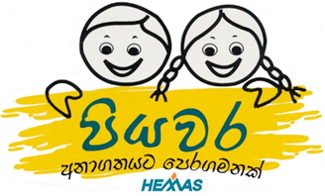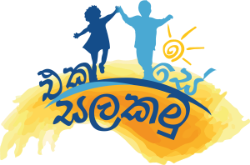
The Foundation’s flagship project, “Piyawara” was launched in 2002 in partnership with the Ministry of Women and Child Affairs focusing on Early Childhood Care and Development (ECCD) in Sri Lanka. It has grown in stature and impact to become one of Sri Lanka’s most successful public-private partnerships with over 62 preschools across the country with more in the pipeline, over 250 teachers and impacting the lives of over 4000 children daily.
The project was named ‘Piyawara’, signifying the initial steps taken by a child at the beginning of the journey through life. Its mission is to nurture children with good care and provide a solid foundation for life.

Mission
“To nature young children with good care in order to provide a SOLID FOUNDATION for a life long journey”
‘Piyawara’, signifying the initial steps taken by a child at the beginning of the journey through life.
Piyawara focuses on key aspects within the framework of early childhood
development

Piyawara focuses on key aspects within the framework of early childhood development:
- Adding Preschools to the national network
- Emergency intervention in response to natural or man-made disasters
- Preschool teacher training
- Parental awareness programmes
- Partnering Sri Lanka Police on curtailing child abuse
- Recreation facilities for children
- Empowering children with special needs
Infrastructure development of preschools
The constant improvement of infrastructure development also plays a critical role in the sustainability of the Piyawara model in Sri Lanka. Model pre-schools are added to the national network while existing schools are upgraded to meet minimum standards. The latest addition to this concept is the Piyawara Community Pre-Schools built for rural marginalised communities.
Piyawara Model Pre-Schools – These accommodate 75 to 100 children and are located in cities or developped villages with easy access. This model has three to four classrooms, a teacher’s office, storage facility, sick room and junior toilets. These model centres have been classified as ‘learning centres’ for other schools in the area and remain a model.

Piyawara Community Pre-Schools – These accommodate upto 50 children and are located in very remote areas giving pre-school access to marginalised communities who have neither electricity nor pipe-borne water. This model consists of two classrooms and two toilets with a tube well and play areas .

Emergency intervention in response to natural or man-made disasters
We focus on children during natural or man-made disasters.
When the Tsunami hit Sri Lanka in 2004, we immediately set up temporary pre-schools and play areas in 29 make-shift camps thus addressing the emotional needs of these vulnerable, displaced children. Going a step further we also launched a massive pre-school development programme.
The post-war era saw many traumatised children in the make-shift camps at Menik Farm. Together with the Children’s Secretariat, we set up pre-schools and play areas to keep them occupied even under difficult circumstances.
Under this programme, teachers were selected from the community and special training provided to them on handling traumatised children. They were supervised by Ministry officials while all required material was provided by us. The most powerful healing process for children facing trauma is play. We thus provide all facilities for these children so that they may have play areas where they can interact with their peers. Other special therapeutic methods such as art therapy and play therapy are used to help these children.
Preschool teacher training
The majority of the Piyawara pre-school teachers are permanent employees of the respective local government authorities. A few of them however work on a voluntary basis. These teachers are trained on a regular basis by the Hemas Outreach Foundation in conjunction with the Ministry of Child Development and Women’s Affairs.
Training includes inter-school visits, exchange programmes, meeting parent groups across the country, etc, thereby giving them the necessary physical and psychological skills to handle children across the social and cultural divide. The annual training is held every August during the school vacation. Teaching methods and skills are also updated thereby bringing them on par with their numerous counterparts in the South East Asian region.

Parental awareness programmes
Piyawara also goes a step further and involves the children’s immediate families and the communities they live in.
Parental awareness programmes are also conducted in the schools and communities. Children spend only four hours at school. The balance is spent with their families. It is therefore important that parents understand the importance of early childhood development as a foundation for a child’s journey ahead. Awareness programs are based on the psychological development of children and how adults should behave, with programs even conducted on national television.
A special 20 minute docu-drama called ‘Daru Petiyage Lokaya’ (A Child’s World) was developed to educate the public on the importance of early childhood development. These DVDs are used by the Ministry to educate young parents around the country. Snippets are also aired on local radio channels as the ‘Thought for the Day’. Similarly a supplementary handbook was printed in both the Sinhala and Tamil languages and distributed free of charge to young parents and at all maternal clinics across the country.
Parent Teacher Associations (PTAs) are formed at all Piyawara Pre-Schools. The initial capital donated to the Association is used to grow the fund for the maintenance of the schools. Very often the adults readily volunteer and get involved in the running of the respective pre-schools.

Partnering Sri Lanka Police on curtailing child abuse
The Hemas Outreach Foundation has also formed a strong partnership with the Sri Lanka Police and the Children’s Secretariat of the Ministry of Child Development and Women’s Affairs, thereby strengthening its efforts to assist the ongoing national campaign to raise awareness and increase training in the protection from and prevention of child abuse.
All Piyawara teachers have been made aware of the dangers of child abuse and the disastrous repercussions it has on one’s psychological development. As parallel measure older children are also gradually being made aware of how to handle such situations and alert their elders. This is as important an area in the Piyawara curriculum as is the formal educational training. Making it an all-inclusive endeavor, awareness and training are also extended to police officers of the respective areas, family members, village elders and local clergy. National television has been a great assistance in disseminating this message across the country thought special awareness programmes.

Recreation facilities for children
Just as much as a traditional education is important for a child’s psychological make-up, so also is recreation. In fact, recreation plays a primary role in a child’s early learning process. The toys and play areas at the Piyawara pre-schools are made of eco-based items from their immediate environment such as coconut shells, seeds, old tyres, etc, all of which are painted and given a new lease of life etc.
The children are thus taught, from a very early age, to appreciate their environment. This project also undertook to build three Piyawara Children’s Parks in areas that lacked recreation for children. Lessons learnt from the Tsunami and then the post-war experience have shown that recreation and play have been a healing process and helped them recover from the scars of trauma. Every Piyawara school thus has a well-planned and well-equipped area.





;)